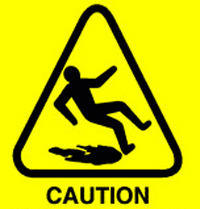Pumphead vs. Dumbhead… From Spike
By Adam Pick on November 8, 2008
In the past we’ve talked about pumphead, the post-operative condition that negatively impacts the cognitive capabilities of some heart surgery patients. Well, Spike (from Nevada) just emailed me a new patient term. He calls it “dumbhead”.
Although Spike’s new term is quite playful, his story (posted below) illustrates several key concerns for heart valve surgery patients. So you know, Spike is a 63-year old male, medically retired US Marine. His valve surgery was performed in Las Vegas at the Summerlyn Heart Institute by Dr. Demetri Mavroidis.

Dear Adam,
I had a mitral valve replacement (tissue valve) and a maze procedure on September 9, 2008. I was released from the hospital five days later on September 14th.
The first of my two dumbhead incidents took place on the second morning after my homecoming.
I failed to consider the amount of blood I lost during surgery. I got up at 5:00am to get a pain pill. Sometime later, I awoke on my tile kitchen floor with a large goose egg on the back of my head, a sprained ankle and… I was lying in a small pool of urine. I banged on the floor until my son awoke and called the paramedics. This resulted in another hospital stay of 36 hours.
The second and more serious of my dumbhead blunders was ignoring my weekly blood tests. I was on Coumadin prior to my surgery. The dosage was increased after my operation. I had my blood tested two weeks after surgery and my clotting factor was good. However, I ignored the test for the next three weeks. I hated to have to ask someone to drive me to the lab for this test.
Last Monday, I had lost my skin color and I couldn’t move without being short of breath. I felt worse than right after the surgery. I had a bowel movement like tar and called the doctor. He told me to go directly to the emergency room as it sounded like I was bleeding from the gut.
To shorten the story, my PT clotting factor was supposed to be between 1-2; mine was a 9 and my hemoglobin was 6.2. They put me in the I.C.U. and gave me 5 units of plasma, 5 units of whole blood, lasix, potassium, proton pump inhibitors and vitamin K. I also had to endure an endoscopy and colonoscopy.
I was released Thursday evening feeling weak but much better. All this could have been avoided if I had gotten the weekly blood checks and did not accept my deterioration as a normal part of the post-operative condition. Also, I now know that part of my dumbhead moves were caused by the cardiac depression you mentioned in your book.
Please pass this along to your readers. I hope future patients and caregivers can learn from my mistakes.
Thanks for everything!
Spike
PS: Despite my stupidity… Your heart valve surgery book prepared me for the experience and the success stories buoyed my spirits.
|
Barbara says on November 8th, 2008 at 5:19 pm |
|
Thanks for all of the reports. I have to go to UCLA next week for a consult for two possible valve leaks. Scared, yes? But a site like this has helped a lot. thanks for being there. Barbara in Bakersfield, Ca |
 |
|
Sherri Hendry says on November 9th, 2008 at 7:19 pm |
|
Barbara- good luck on your consult. I go this Wednesday for mine. I have a leaky Mitral Valve. I too am scared but not as much as I would have been not knowing anything – then having a major complication later. I am also thankful for this site. I have learned sooo much in such a short time from it. ADAM – thank you. Sherri |
 |
|
Mary Ferraro says on November 14th, 2008 at 6:30 pm |
|
I had my mitral valve repaired 18 days ago and still hate asking people for rides to the doctor or for Rx, but I learned from my therapist that it is selfish to not let those who love us have the opportunity to express that love by helping. Just ask and worse case is they say no, so you ask somebody else. Maybe the first guy can help at a later time. Just say thank you and know that some day you can be there for when they need your help. |
 |
|
makarand vaidya says on February 24th, 2012 at 7:03 am |
|
I have undergone bypass surgery in 1997 and surgery for replacement o LVF in 2002.Now I experience swelling on legs. Can and should the legs be massaged to push up the retained water in the legs? I am already under treatment with lasix/(1-2 tablet in the morning and half in the evening) |
 |













